Pianist Isata Kanneh-Mason and cellist Sheku Kanneh-Mason are two of seven highly gifted siblings from Nottingham, England, who are creating a worldwide sensation. Sheku is best known for his performance during the royal wedding of Meghan Markle and Prince Harry in 2018. His elder sister, Isata, recipient of the 2021 Leonard Bernstein Award, is forging a major career of her own as virtuoso pianist.
Recently we had a chance to speak with both of them as they prepared for a major North American tour that includes such prestigious venues as Carnegie Hall, Walt Disney Hall, Symphony Hall Boston … and Kansas City’s Folly Theater.
On April 29th and 30th, Isata and Sheku will perform two different recitals at the Folly, courtesy of the Harriman-Jewell Series. For tickets call 816-415-5025 or go to hjseries.org. Also see kannehmasons.com. The following transcript has been lightly edited.
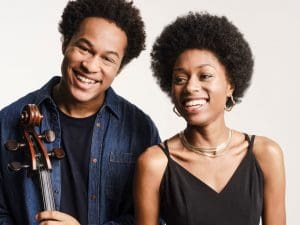
Sheku and Isata Kanneh-Mason
P: What made you decide that this was the right time for such an extensive tour, and how will this be different from previous North American engagements?
Isata: With the pandemic, especially, we’ve had such a gap of no concerts, and having done different projects at home, we’ve had a lot of time to think and discover new repertoire. So this really feels like the perfect time: Things have just started moving again, we both feel really ready to bring music out there… travel again and go to as many places as possible.
P: Tell us about putting together this big program. Uniquely to the 14 cities you’re visiting in North America, you’re doing two programs in Kansas City, one of which is a quite serious recital of four big sonatas: Karen Khachaturian, Dmitri Shostakovich, Frank Bridge, Benjamin Britten. How would you help an audience understand why these four works belong together?
Sheku: The Bridge and the Britten… both are composers that are heard a lot over here in Britain, but not so much there. Bridge is a wonderful composer and was actually a teacher of Benjamin Britten, and for me his is one the great late-Romantic sonatas for cello. … The Britten was written for Rostropovich, and is an amazing sonata of five movements, almost like a suite of different character-pieces.
The Shostakovich Sonata is probably the most well-known work on the program of the sonatas, and for very good reasons. It’s an amazing sonata, and one that we’ve known the longest. But the newest one to us is the Karen Khachaturian sonata, which was also written for Rostropovich, and premiered by him with the composer playing the piano.
P: There are recordings of three of these sonatas with the respective composers at the piano, and the fourth, the Bridge, with Britten at the piano. Rostropovich, for whom they were written, is the common factor in all these recordings. How do you regard a composer’s own interpretation of a piece: This is as much a question for Isata as for Sheku. What do you learn from a composer’s recording, and what are the perils of listening to a composer’s own interpretation?
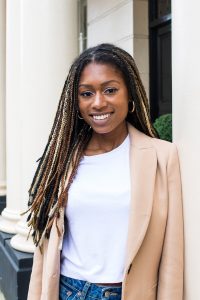
Isata Kanneh-Mason / Photo by Robin Clewley
Isata: It’s really interesting: When you listen to a composer playing their own piece, you often think, okay: Is this exactly how they want it? In that way, it’s really informative, because you might make certain decisions based on how they’re playing it.
But I also think that when a composer composes a piece, he puts it out there for other musicians to interpret. And… there are stories of composers hearing someone playing their piece and saying, Oh I didn’t know it could sound like that: I really like it!
So I don’t think that if you listen to a composer’s recording you therefore need to copy everything. I think you can definitely learn a lot, in terms of what they might have felt about the piece, and gain inspiration from that. But then you still have to make it your own as well.
P: Because Rostropovich was central to the four pieces you’re playing on the first program, in terms of the public knowledge of them, how would you describe what he brought to the public appreciation of the cello in his lifetime?
Sheku: It’s amazing what he showed, in terms of the expressive possibilities of the instrument. Of course he was an incredible cellist technically, and there are some common things in the pieces that were written for Rostropovich, sort of technical things, that he was very, very good at. But I think it’s more the large amount of expression: the cello’s ability to be an instrument that can really carry an audience… carry a performance. I think that’s what he showed.
P: In the last few years, there’s been a greater awareness of diversity, or the lack thereof, in classical music. Seeing an ethnically diverse group of musicians onstage is one thing. But how do we convince our general audiences that this tradition, which flourished under European feudalism for eight centuries, does indeed apply to them: that it should matter to them? Having devoted much as much of your careers to this music, do you believe there is something unique about it, when viewed in the context of global music?
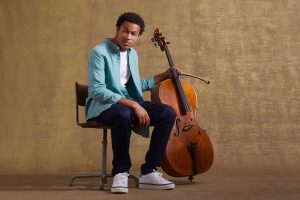
Sheku Kanneh-Mason / Photo by Jake Turney
Sheku: To the first question, the best of classical music is speaking about very genuine emotions, and hopefully can speak on some level to a broad range of people. So if it’s performed in the most honest and direct way, I have found that it can speak to a wide range of audiences. That’s always been my focus when it comes to this question of purpose. Hopefully us performing onstage, we can act as role models but ultimately the music itself has to speak for itself.
Isata: We both think about this in a very similar way. I was also going to add that, as far as people believing that they can be part of this world: It starts with them seeing it. People see young people onstage, or they see Black people onstage, and maybe they’re also young and Black, they also feel: Oh that’s someone that looks like me, and therefore I could do that. So it comes from visual representation.
P: Braimah, your oldest brother, and Konya, the next-oldest sister after Sheku, are now sometimes performing together as a duo. Can we expect to see that as a duo emerging separately, or even perhaps see a trio, with three of you (Braimah, Sheku, and Isata) touring together someday soon?
Isata: Definitely. We still play together as a trio, us two and Braimah, and actually have concerts planned. So hopefully we’ll do more of that. But yes, Braimah plays concerts with Konya and he also plays with our sister, Jeneba, they kind of alternate. So it more depends on people’s schedules: We try to fit in different combinations when we can.
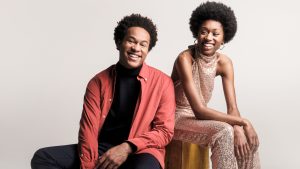
Photo courtesy of Universal Music Group
P: I’d like to ask each of you, separately, this question: Where you think extraordinary gifts come from, be they musical or otherwise, and why are they given to some people and not others? It can’t all be explained by nurture alone. Or do you believe everyone has extraordinary gifts, and given the right environment they can be brought out?
Sheku: I don’t know how one would test that. Because it’s not just a case of the perfect environment, it’s also a case of the perfect environment for that individual, as well, to flourish. So a great teacher for me wouldn’t be a good teacher for someone else. … So I’ve found that the most important thing is that I really love this music and feel enthusiastic about it and inspired by it.
Add to that the gift that we talk about: But that also has come from listening to it from a young age and being surrounded by how many others who also love and enjoy this music. I’m not a scientist, but from my perspective it’s most important just having the opportunity to explore lots of different things. … Finding the thing that speaks to you the most is the most important factor.
Isata: I would agree with that. We probably all have innate interests and things that we’re naturally drawn to, but then you need the right environment. We all have gifts which slightly differ. I don’t think anyone’s born without anything. But it’s about finding your own unique thing that works for you.
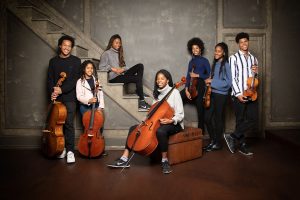
The Kanneh-Mason siblings (from left): Sheku, Mariatu, Isata, Jeneba, Konya, Aminata, and Braimah
P: What’s a favorite story about being recognized on the street, or mobbed by fans?
Isata: Actually I think a good one was when we were both traveling to a concert somewhere in the UK, and we missed our stop because we weren’t paying attention. And then we got off at a random stop and we would have had to pay a lot of money to get another train to get back to where we needed to be.
So we were asking a ticket guard for help, and then he happened to recognize us. He recognized Sheku, and then he kind of just helped us, and we ended up not having to pay and we could just use our original ticket to get back. So I think was a very useful example, but that doesn’t always happen.
P: What has formed your impression, so far, of what the Great Plains are like?
Sheku: We are really just looking forward to finally getting there and meeting the audience. We have two days of concerts, with I think half a day in between, so I think we have some time to see a few things. … We don’t have much time, but we’ll try to make the most of the time that we have.
P: Thank you both very much for your time, and we look forward to greeting you here in Kansas City.
Both: Thank you. See you soon!
—By Paul Horsley
To reach Paul Horsley, performing arts editor; send an email to paul@kcindependent.com or find him on Facebook (paul.horsley.501) or Twitter/Instagram (@phorsleycritic).